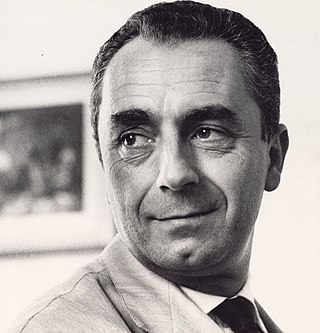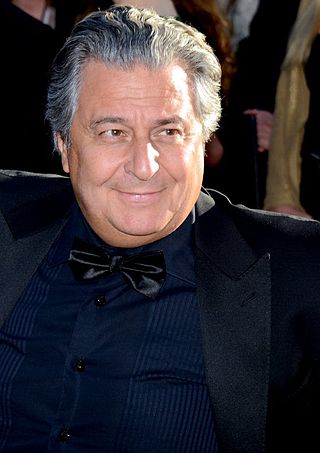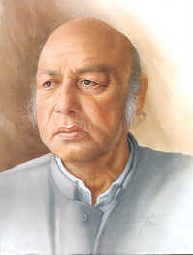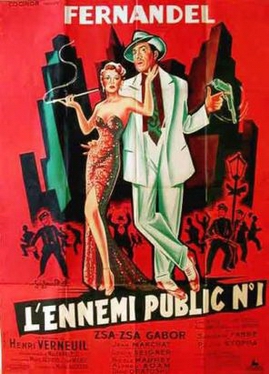
Michelangelo Antonioni was an Italian director and filmmaker. He is best known for his "trilogy on modernity and its discontents"—L'Avventura (1960), La Notte (1961), and L'Eclisse (1962)—and the English-language film Blowup (1966). His films have been described as "enigmatic and intricate mood pieces" that feature elusive plots, striking visual composition, and a preoccupation with modern landscapes. His work substantially influenced subsequent art cinema. Antonioni received numerous awards and nominations throughout his career, being the only director to have won the Palme d'Or, the Golden Lion, the Golden Bear and the Golden Leopard.

Mario Alberto Ettore Monicelli was an Italian film director and screenwriter, one of the masters of the commedia all'italiana. He was nominated six times for an Oscar, and received the Golden Lion for his career.
Barzakh is an Arabic word meaning "obstacle", "hindrance", "separation", or "barrier". In Islam, it denotes a place separating the living from the hereafter or a phase/"stage" between an individual's death and their resurrection in "the Hereafter". It is also considered as a place where souls rest until the day of judgement. It bears resemblance to the Intermediate state in Christianity.

Christian Jean-Marie Clavier is a French actor, screenwriter, film producer and director. A founder of Le Splendid in the 1970s, a Parisian café-théâtre company which soon garnered success, he became widely popular after starring in two hit comedy series: Patrice Leconte's Les Bronzés and Jean-Marie Poiré's Les Visiteurs.

Pierre Joris is a Luxembourger-American poet, essayist, translator, and anthologist. He has moved between Europe, North Africa, and the United States for fifty-five years, publishing over eighty books of poetry, essays, translations and anthologies — most recently Interglacial Narrows and Always the Many, Never the One: Conversations In-between, with Florent Toniello, both from Contra Mundum Press. In 2020 his two final Paul Celan translations came out: Microliths They Are, Little Stones and The Collected Earlier Poetry (FSG). In 2019 Spuyten Duyvil Press published Arabia Deserta. Other recent books include: A City Full of Voices: Essays on the Work of Robert Kelly ; Adonis and Pierre Joris, Conversations in the Pyrenees ; Stations d'al-Hallaj ; The Book of U. His translation of Egyptian poet Safaa Fathy's Revolution Goes Through Walls came out in 2018 from SplitLevel. In June 2016 the Théatre National du Luxembourg produced his play The Agony of I.B.. Earlier publications include: An American Suite ; Barzakh: Poems 2000-2012 ; Breathturn into Timestead: The Collected Later Poetry of Paul Celan ; A Voice full of Cities: The Collected Essays of Robert Kelly and The University of California Book of North African Literature.

Habib Jalib was a Pakistani revolutionary poet and left-wing political activist who opposed martial law, authoritarianism, military dictatorship and state oppression. He wrote several poems in Punjabi and Urdu; and was referred to as the "poet of the masses" by his contemporary Faiz Ahmad Faiz.

Al-Sayyid Muhammad al-Hasan bin ‘Alawi bin ‘Abbas bin ‘Abd al-‘Aziz (1944–2004), also known as Muhammad ibn Alawi al-Maliki, was one of the foremost traditional Sunni Islamic scholar of contemporary times from Saudi Arabia. He is considered to be the Mujaddid of 20th-21st century.
François Nourissier was a French journalist and writer.

Habib Tanvir was one of the most popular Indian Urdu, Hindi playwrights, a theatre director, poet and actor. He was the writer of plays such as, Agra Bazar (1954) and Charandas Chor (1975). A pioneer in Urdu and Hindi theatre, he was most known for his work with Chhattisgarhi tribals, at the Naya Theatre, a theatre company he founded in 1959 in Bhopal. He went on to include indigenous performance forms such as nacha, to create not only a new theatrical language, but also milestones such as Charandas Chor, Gaon ka Naam Sasural, Mor Naam Damad and Kamdeo ka Apna Basant Ritu ka Sapna.

Fabrizio Gatti is an Italian investigative journalist and author. He is also Editorial editor, Insight, at the Italian daily Today.it. Between 1987 and 2022 Gatti wrote for the Italian weekly l'Espresso, the daily "Corriere della Sera" and before "il Giornale" and "il Cittadino". His reportages and undercover investigations have been translated all over the world.
Moussa Ould Ebnou is one of Mauritania’s greatest novelists. He has published two novels in French: L’amour impossible (1990) and Le Barzakh (1994), which were later published in Arabic as: الحب المستحيل (1999), and مدينة الرياح (1996). Ebnou has also published two other works in Arabic: حج الفجار (2003), and الامثال والحكم الشعبية الموريتانية al-Imthal w'al-Hakm ash-Sha'biya al-Muritaniya.
Censorship in Italy applies to all media and print media. Many of the laws regulating freedom of the press in the modern Italian Republic come from the liberal reform promulgated by Giovanni Giolitti in 1912, which also established universal suffrage for all male citizens of the Kingdom of Italy. Many of these liberal laws were repealed by the Mussolini government already during the first years of government.
Habib-ur-Rehman, better known by his screen name Habib, was a Pakistani film actor, director, producer and a television actor. He was one of the busiest heroes of the Pakistani film industry and established himself as one of the most successful actors of Pakistani cinema, acting in almost 600 movies in a career spanning 60 years. He appeared in both Punjabi and Urdu language movies.

Kamel Daoud is an Algerian writer and journalist. He currently edits the French-language daily Le quotidien d’Oran, for which he writes a popular column, "Raïna Raïkoum". The column often includes commentary on the news.

The Most Wanted Man or Public Enemy Number One is a 1953 French-Italian comedy film directed by Henri Verneuil and starring Fernandel, Zsa Zsa Gabor and Louis Seigner. It was shot at Cinecittà Studios in Rome. The film's sets were designed by the art director Robert Giordani. It was one of many co-productions between the France and Italy during the postwar era.

Nitchevo is a 1936 French drama film directed by Jacques de Baroncelli and starring Harry Baur, Marcelle Chantal and George Rigaud. It is a remake of the 1926 silent film of the same name.

Mune: Guardian of the Moon is a 2014 French computer-animated adventure fantasy film directed by Benoît Philippon and Alexandre Heboyan and written by Philippon and Jérôme Fansten. Featuring the voices of Michael Gregorio, Omar Sy and Izïa Higelin, the film tells the story of the guardian of the Moon, who must recover the stolen Sun. It premiered at Forum des images on December 6, 2014, and was theatrically released in France on October 14, 2015.
The 1987 Tunisian coup d'état involved the bloodless ousting of the aging President of Tunisia Habib Bourguiba on 7 November 1987, and his replacement as President by his recently appointed Prime Minister, Zine El Abidine Ben Ali. The action was justified by reference to Bourguiba's failing health and Article 57 of the country's constitution. Reports later surfaced to indicate that the Italian intelligence services had been involved in planning it.
Mantas Kvedaravičius was a Lithuanian filmmaker, anthropologist, and archaeologist known for war reporting in hostile areas. He was killed during the Siege of Mariupol.












